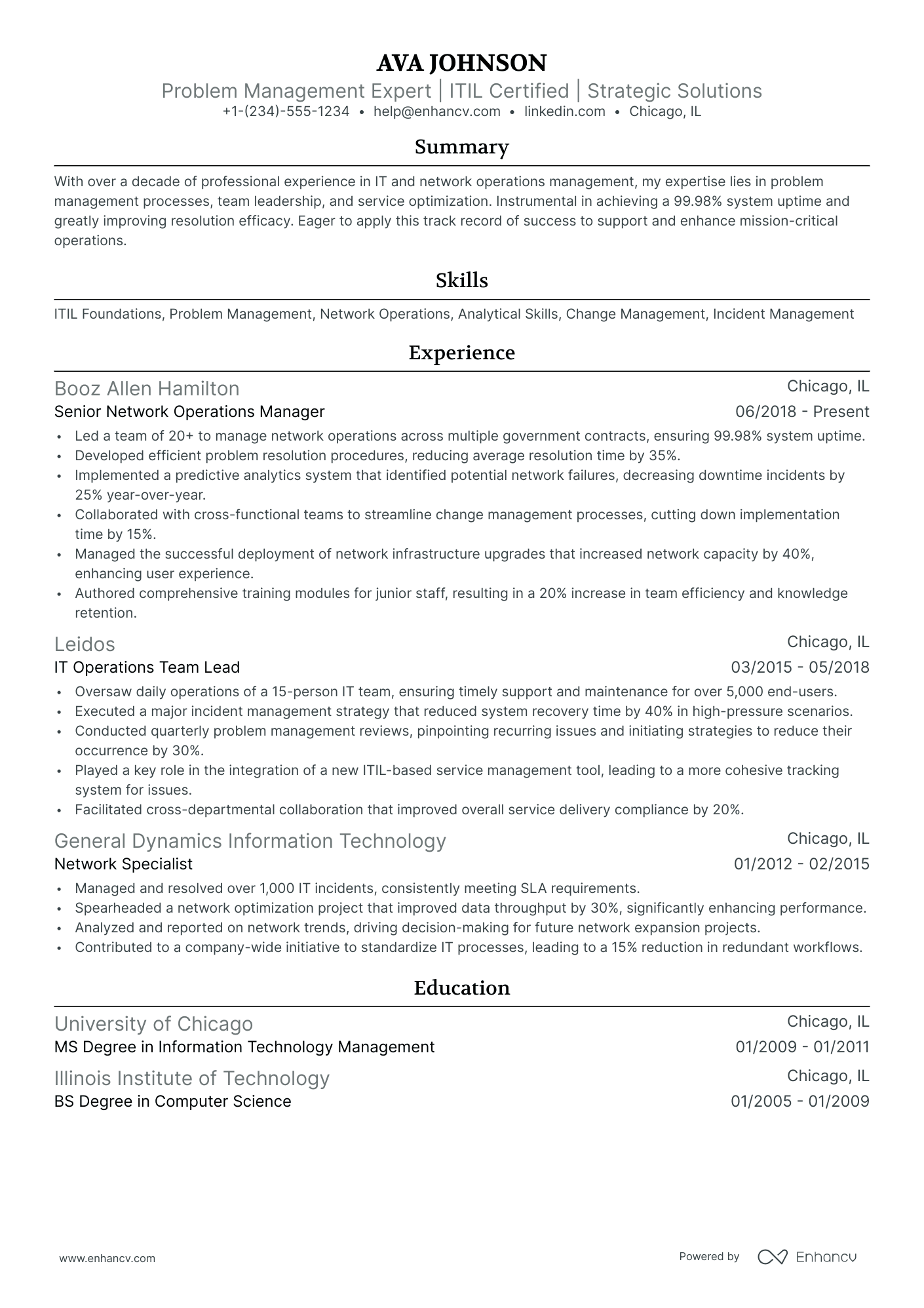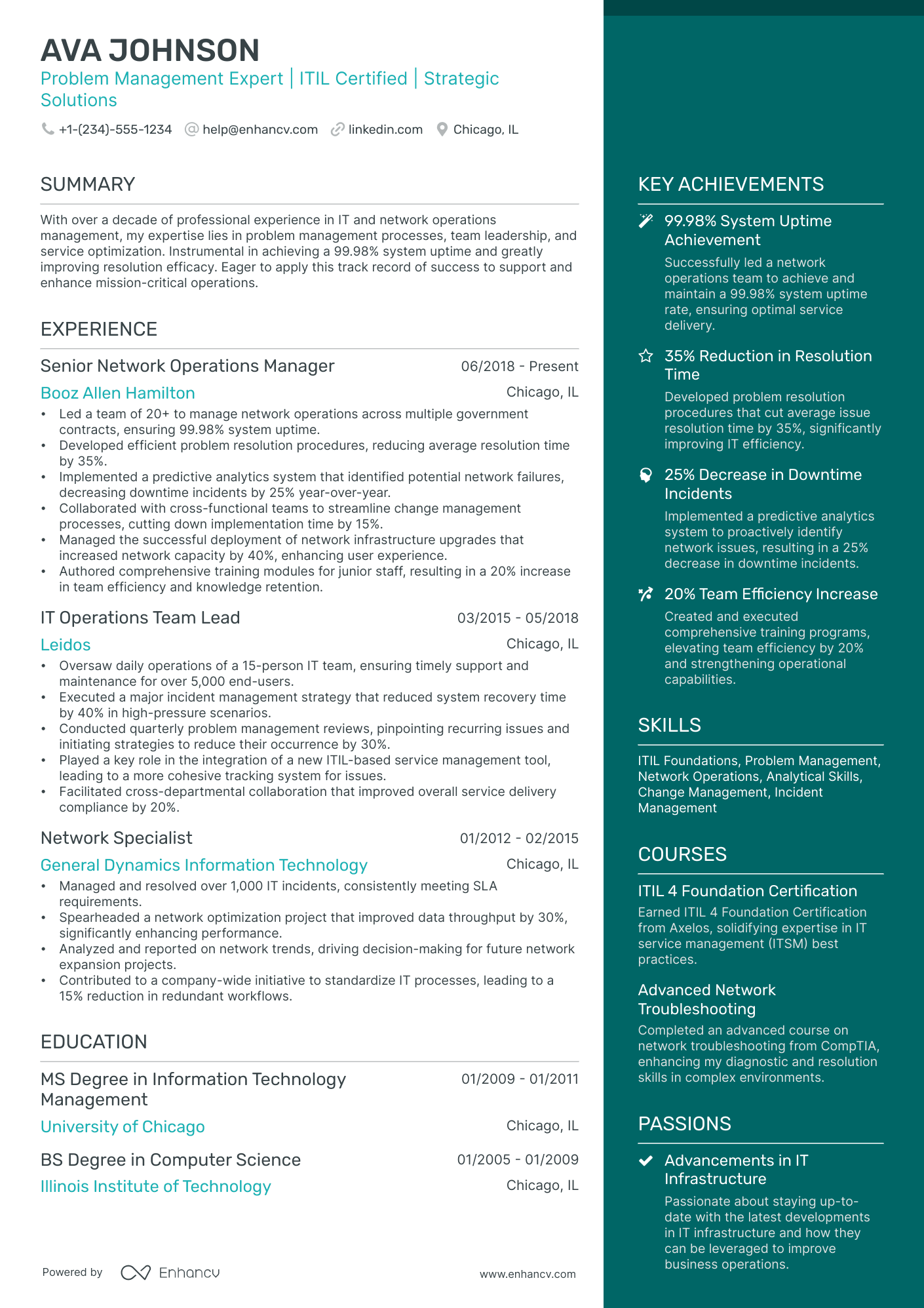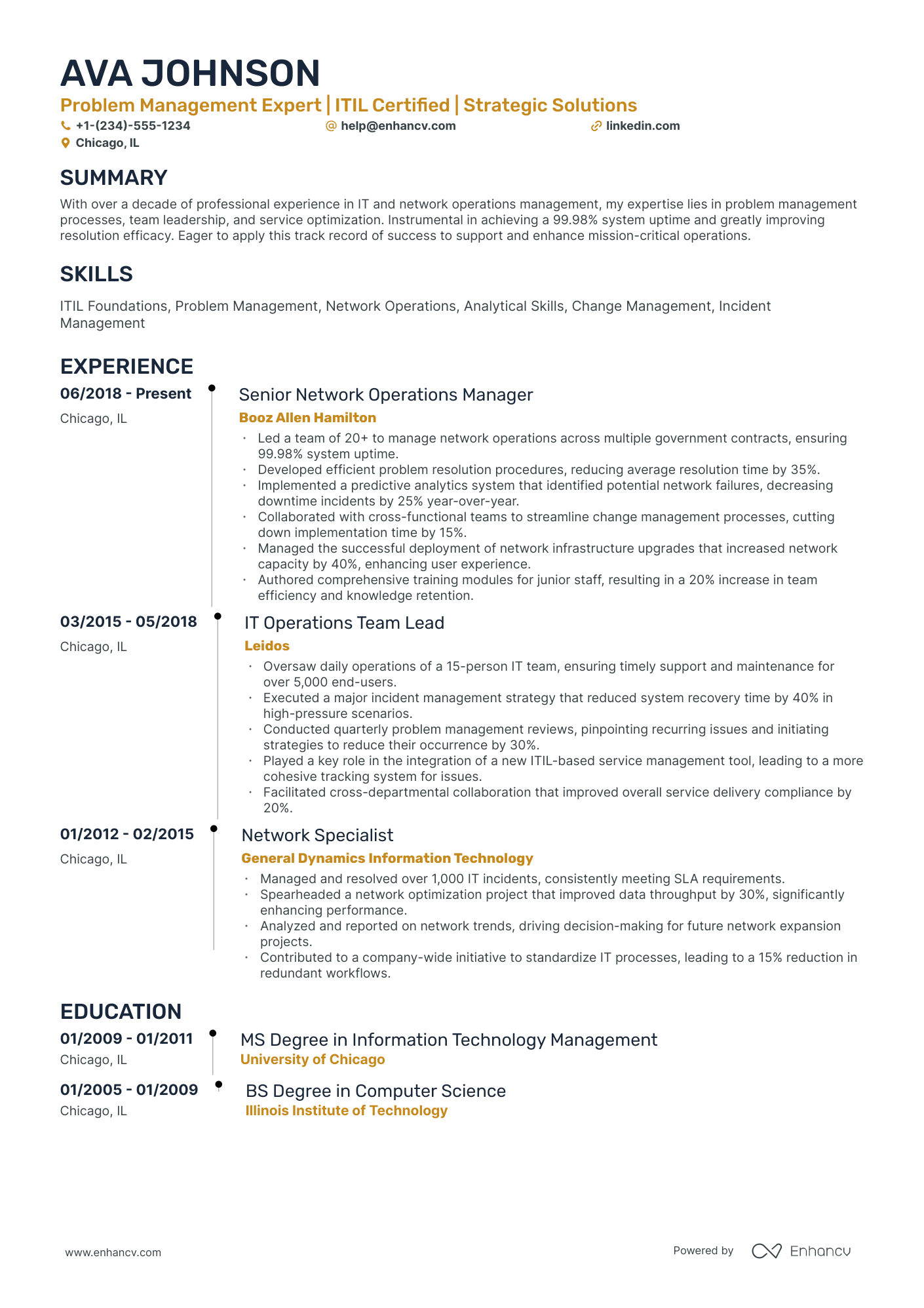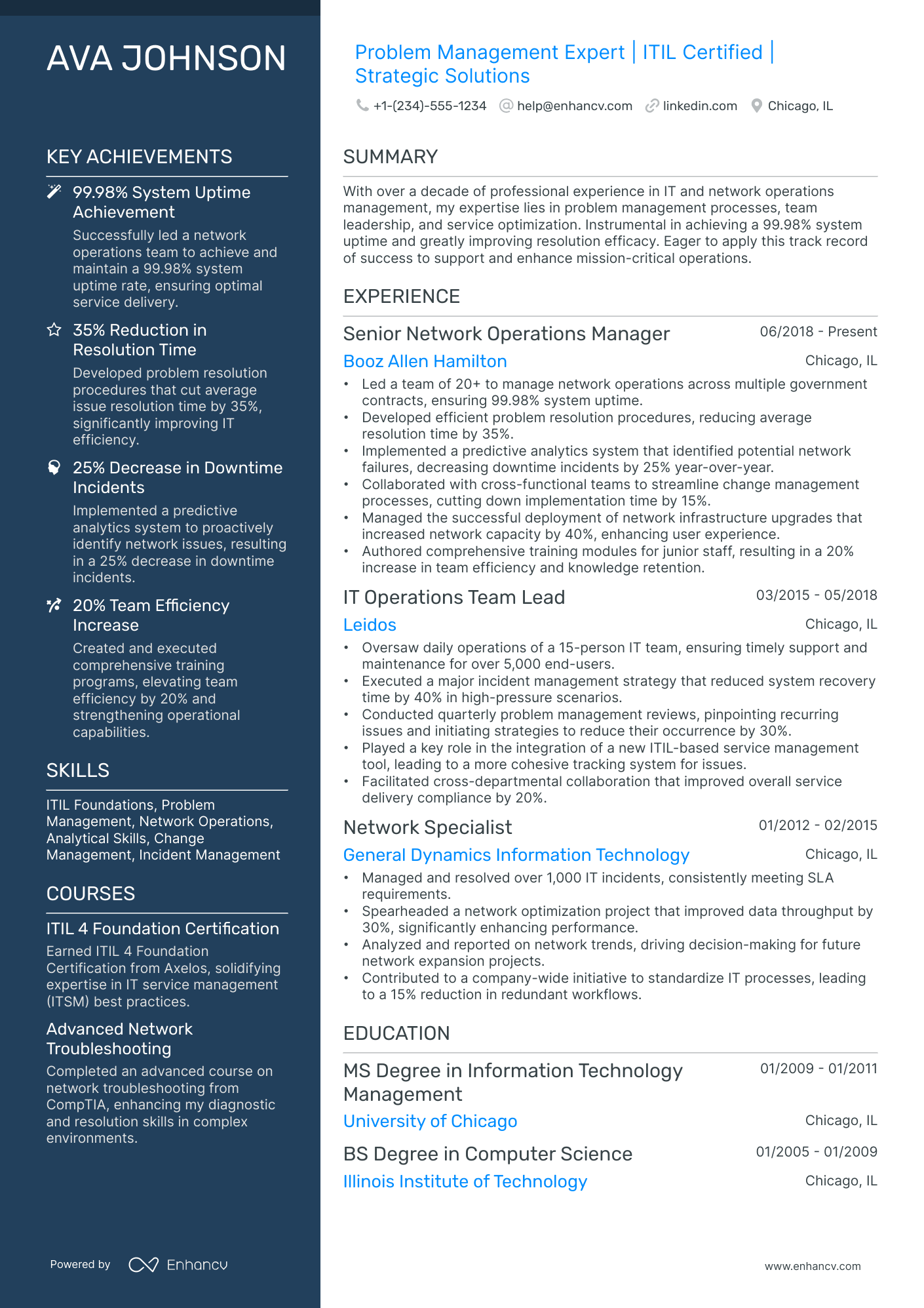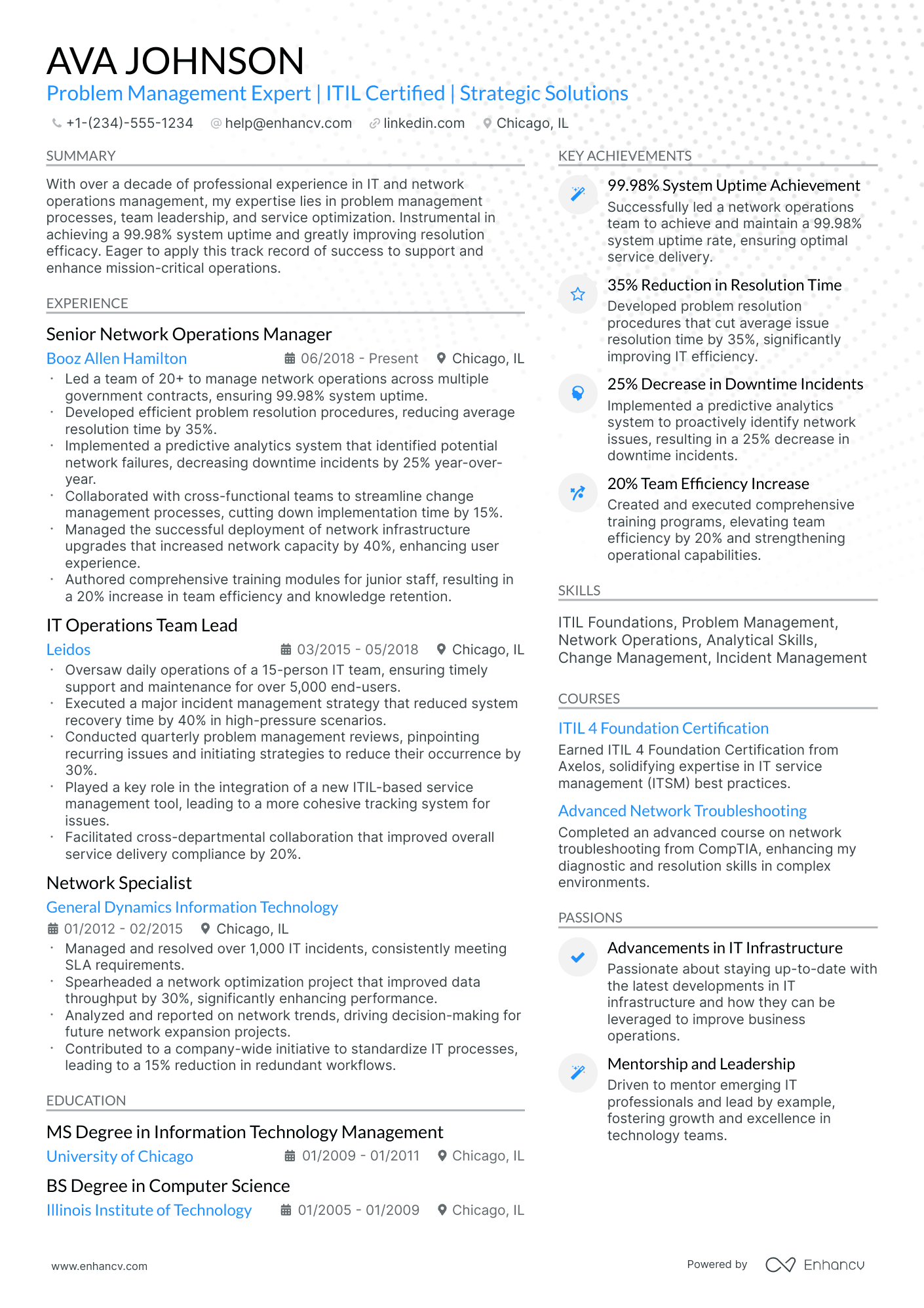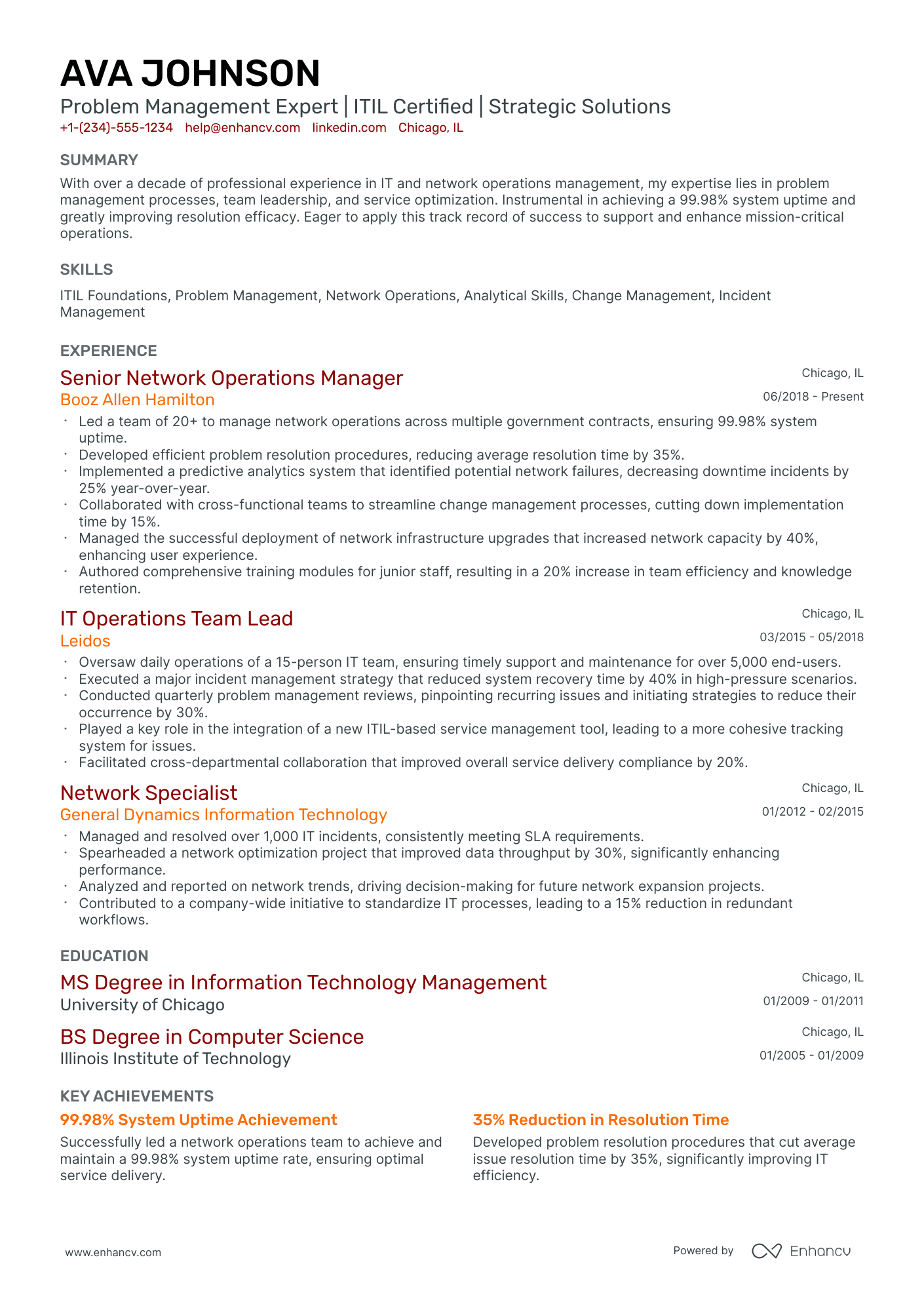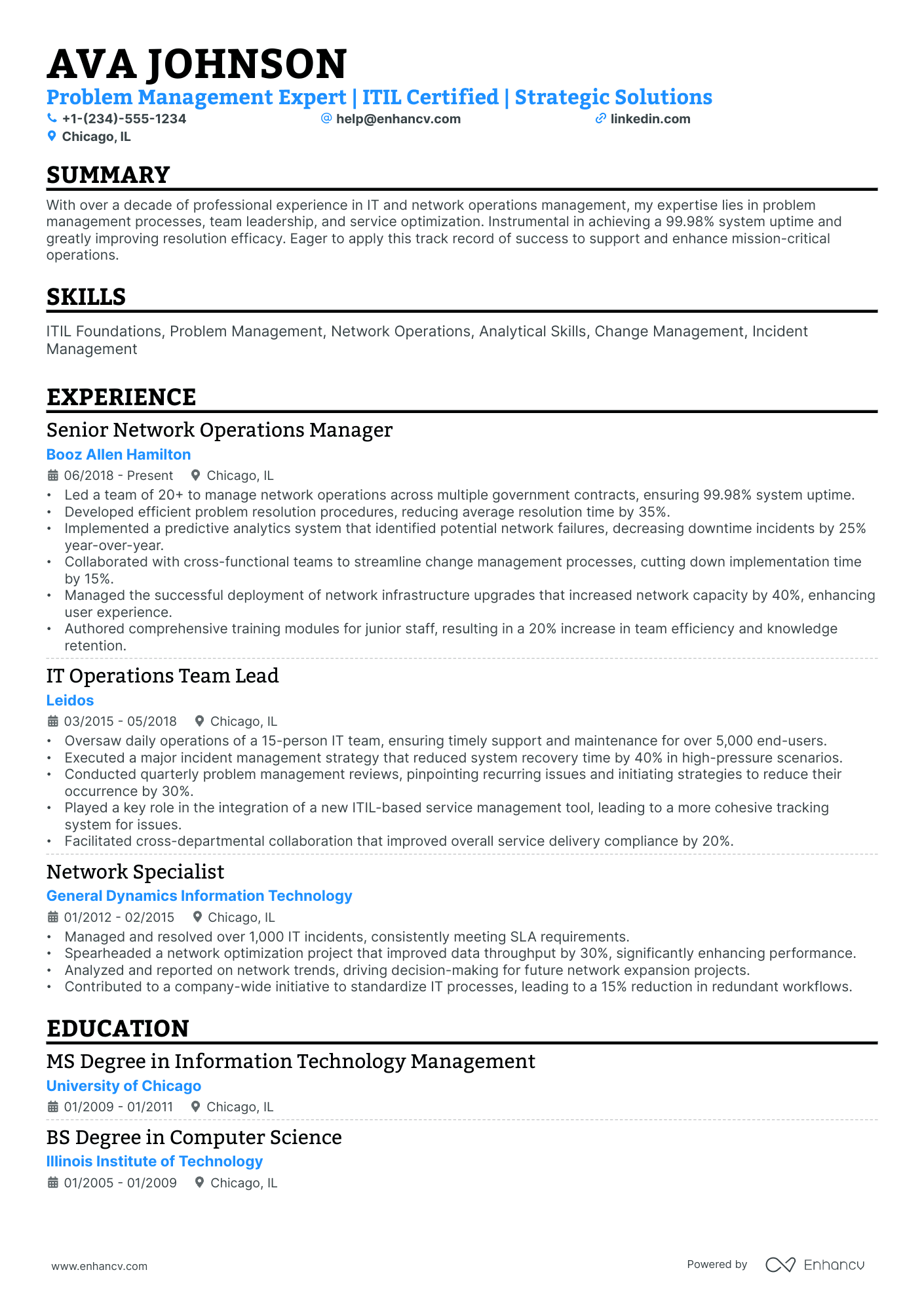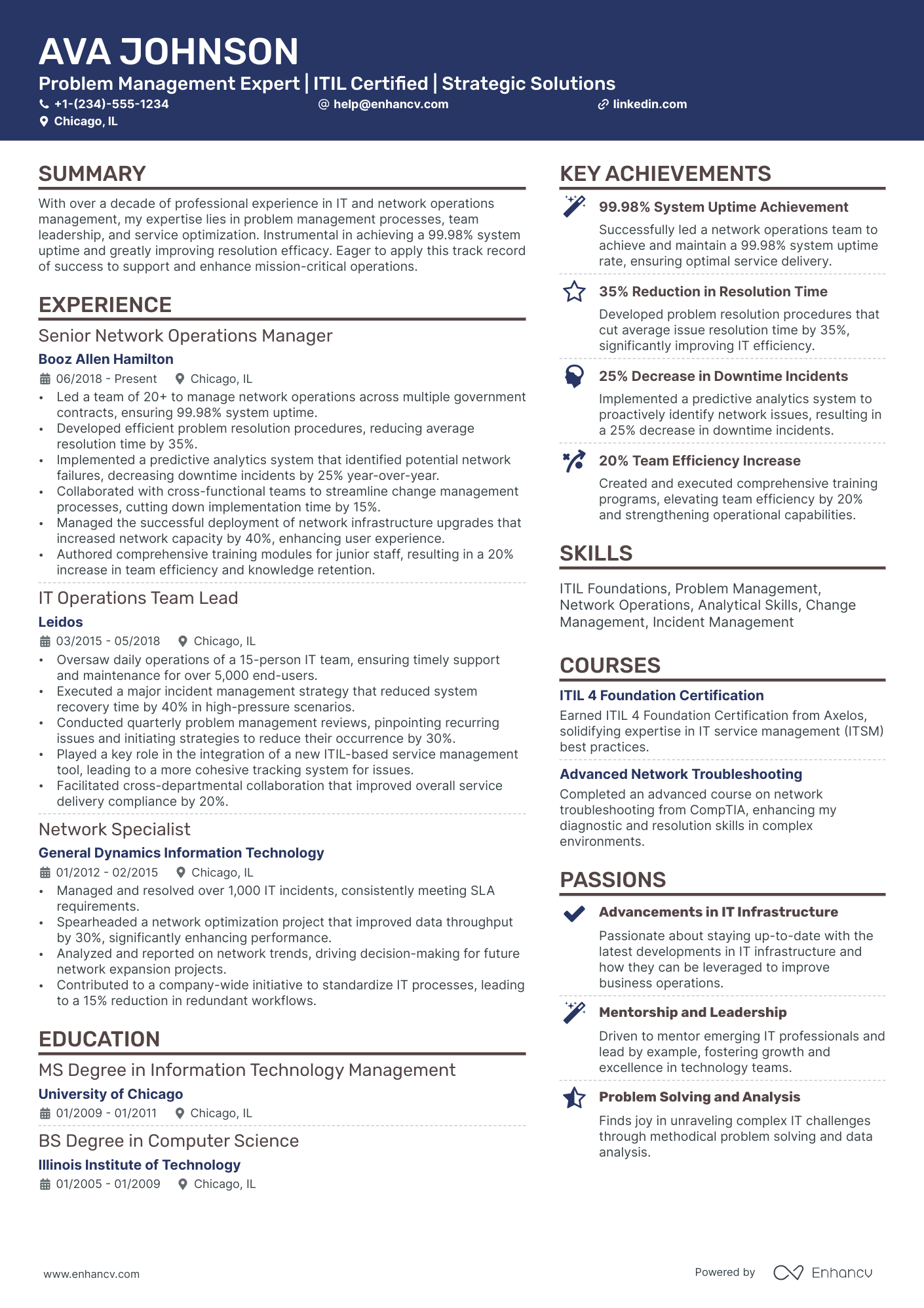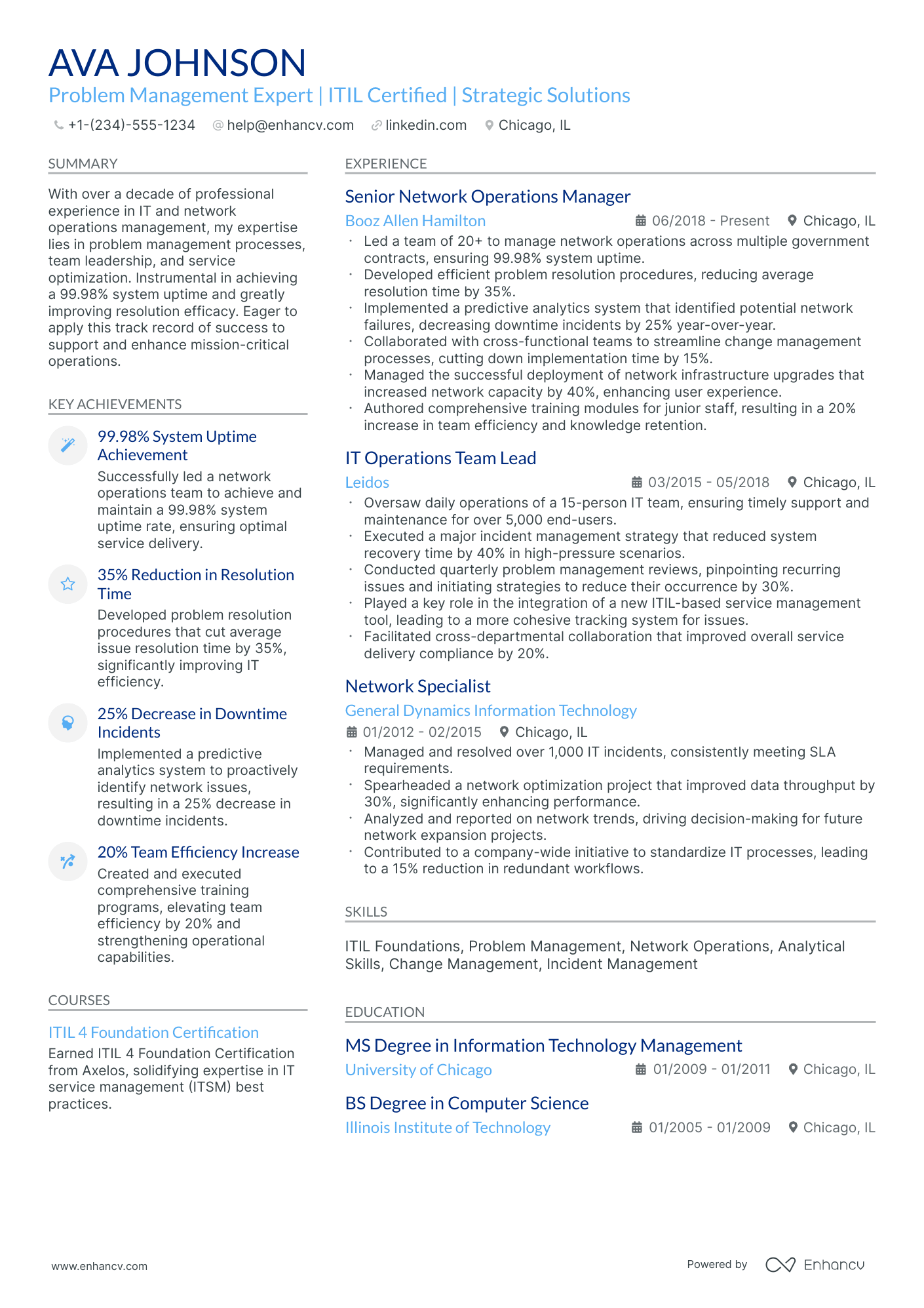As a problem manager, articulating the complexities of managing and mitigating issues within a project can be a daunting task on your resume. Our guide offers tailored strategies to effectively showcase your problem-solving skills and experience, ensuring you stand out to potential employers.
- Get inspired from our problem manager resume samples with industry-leading skills, certifications, and more.
- Show how you can impact the organization with your resume summary and experience.
- Introducing your unique problem manager expertise with a focus on tangible results and achievements.
If the problem manager resume isn't the right one for you, take a look at other related guides we have:
- Assistant Operations Manager Resume Example
- People Manager Resume Example
- HR Business Partner Resume Example
- HR Generalist Resume Example
- Benefits Manager Resume Example
- Contract Analyst Resume Example
- HR Analyst Resume Example
- HR Resume Example
- Benefits Analyst Resume Example
- Staffing Manager Resume Example
Don't stress out over your problem manager resume format
Remember, the elaborate design of your problem manager resume isn't what impresses recruiters most. They are primarily searching for candidates who meet the job requirements. The main aim of your resume should be to clearly and concisely explain why employers should hire you.
Here are four straightforward steps to consider in your problem manager resume design:
- Organize your resume based on experience: Start with your most recent roles. Besides using reverse chronological order, choose jobs relevant to the position you're applying for.
- Include your contact details (and portfolio or LinkedIn link) in your resume's header to ensure recruiters can easily reach you. If considering adding a professional photo, check acceptable practices in different countries first.
- Don't omit essential problem manager resume sections such as the summary or objective, experience, and education. These sections should reflect your career progression and align with job requirements.
- Maintain conciseness in your resume. For those with less than ten years of experience, a one-page format is advisable.
Regarding the format to submit your problem manager resume, PDF is preferable. PDFs are more likely to maintain their formatting when processed through recruitment software or ATS, saving you time in the application process.
When selecting a font for your problem manager resume, consider the following:
- Choose ATS-friendly fonts such as Exo 2, Volkhov, Lato, etc., to keep your resume's content legible;
- All serif and sans-serif fonts are easily readable by ATS;
- While Arial and Times New Roman are common choices, opting for unique typography can help your resume stand out.
Concerned about ATS compatibility with charts and infographics? Our recent study has debunked this and other myths.
Think about the location of your application – Canadian resumes, for instance, might follow a different structure.
Upload & Check Your Resume
Drop your resume here or choose a file. PDF & DOCX only. Max 2MB file size.
PRO TIP
Mention specific courses or projects that are pertinent to the job you're applying for.
The five (plus) definite sections your resume for a problem manager job should include are:
- Header with your headline, contact details, and/or a preview of your work
- Summary (or objective) to pinpoint how your success aligns with the role
- Experience with bullets of your most relevant achievements in the field
- Skills to integrate vital job requirements (both technical and personal)
- Your further dedication to the field, showcased via relevant higher education and/or certifications
What recruiters want to see on your resume:
- Proven experience in problem management methodologies like Kepner-Tregoe, ITIL, or Six Sigma.
- Demonstrated ability to lead root cause analysis (RCA) and implement permanent corrective actions.
- Strong analytical skills with a track record of identifying underlying issues and trends to prevent future incidents.
- Experience with problem management tools and software, such as ServiceNow or JIRA.
- Communication and coordination skills to liaise between IT teams, stakeholders, and vendors for comprehensive problem resolution.
Essential tips for crafting your problem manager resume experience section
The experience section is indeed the core of your problem manager resume. It's where you present your past and current job roles. But how should you approach this crucial part?
A common error is treating the experience section as merely a list of job duties. Many candidates fall into the trap of detailing what they did without illustrating the impact of their actions.
To effectively write your problem manager resume experience section, consider these guidelines:
- Emphasize your achievements, supported by concrete metrics such as percentages, revenue increases, or customer satisfaction rates;
- Avoid using generic buzzwords like communication, hard work, or leadership. Instead, demonstrate how these skills added value in your previous roles;
- Begin each bullet point with a strong action verb, followed by a skill, and then the result of your actions;
- Tailor your resume for each job application by selecting the most relevant experiences, responsibilities, and successes.
We have an array of resume examples that illustrate how to optimally curate your problem manager resume experience section.
- Led a team that successfully reduced recurring incidents by 40% through a comprehensive root cause analysis and process improvement plan across key service lines.
- Implemented a new ITIL-based problem management framework, overseeing the resolution of over 500 critical incidents for high-profile clients.
- Collaborated with cross-functional teams to redesign incident management processes, yielding a 25% improvement in response times for major incidents.
- Authored and executed a strategic plan for problem management that integrated with broader IT service management initiatives, directly supporting business continuity.
- Spearheaded the development of a bespoke incident logging tool which resulted in a 30% increase in accurate problem categorization and prioritization.
- Championed the use of predictive analytics for problem identification, significantly reducing system downtime for client-facing applications.
- Directly responsible for a 35% year-on-year reduction in unresolved problems by establishing a robust problem-solving culture within the IT department.
- Designed and facilitated problem-solving training for over 200 IT personnel, enhancing the team's skills in root cause analysis.
- Initiated and led a successful migration to a modernized problem-tracking platform that improved reporting efficiency by 50%.
- Conducted thorough root cause investigations for over 300 major incidents, efficiently mitigating potential risks and preventing recurrence.
- Instrumental in the creation of a knowledge database that led to a 20% faster resolution time for recurring incidents.
- Coordinated with external vendors to ensure seamless integration of third-party services into the existing problem management strategy.
- Developed and implemented an enhanced monitoring system that identified problems 50% quicker than the legacy system.
- Orchestrated a collaborative effort to standardize problem resolution documentation, resulting in improved compliance with industry best practices.
- Managed a successful project to integrate AI-driven analytics into the problem management process, reducing human error in initial problem assessment.
- Masterminded an organization-wide adoption of proactive problem management practices, leading to a sustained performance improvement in service delivery.
- Oversaw the resolution of over 1,000 incidents, with a focus on minimizing the impact on business operations and maintaining service level agreements.
- Facilitated post-incident reviews and implemented corrective actions that substantially improved cross-team collaboration and knowledge sharing.
- Played a pivotal role in reducing downtime for critical systems by 60% through enhanced problem investigation and rapid deployment of solutions.
- Leveraged ITSM tools to streamline problem management processes, resulting in a 25% increase in workflow efficiency.
- Engaged with senior management to align problem management goals with overall business objectives, ensuring a customer-focused approach to IT service delivery.
- Pioneered the implementation of a cross-department problem management policy, significantly enhancing interdepartmental communication and collaboration.
- Enhanced IT operational stability by proactively identifying and addressing systemic issues, reducing critical incidents by over 30%.
- Organized and conducted regular training sessions on problem analysis techniques, contributing to a more skilled and efficient IT support team.
Quantifying impact on your resume
- Include the average reduction percentage in incident recurrence due to implemented problem management solutions.
- State the number of problem investigations led that resulted in successful root cause analysis.
- List the amount of cost savings generated through problem resolution activities.
- Mention the percentage improvement in service availability or performance from your problem management efforts.
- Quantify the decrease in mean time to repair (MTTR) for incidents related to major problems you addressed.
- Detail the volume of incidents deflected or reduced through proactive problem management.
- Express the number of cross-functional teams collaborated with to ensure comprehensive problem resolution.
- Report the increase in customer satisfaction scores linked to the resolution of chronic problems.
Action verbs for your problem manager resume
Guide for problem manager professionals kicking off their career
Who says you can't get that problem manager job, even though you may not have that much or any experience? Hiring managers have a tendency to hire the out-of-the-blue candidate if they see role alignment. You can show them why you're the best candidate out there by:
- Selecting the functional skill-based or hybrid formats to spotlight your unique value as a professional
- Tailoring your problem manager resume to always include the most important requirements, found towards the top of the job ad
- Substituting the lack of experience with other relevant sections like achievements, projects, and research
- Pinpoint both achievements and how you see yourself within this specific role in the problem manager resume objective.
Recommended reads:
PRO TIP
If you're in the process of obtaining your certificate or degree, list the expected date you're supposed to graduate or be certified.
Balancing hard and soft skills in your problem manager resume
Recruiters indeed pay close attention to the specific hard and soft skills candidates possess. Hard skills refer to technical abilities or your proficiency in technologies, while soft skills are the personal attributes and qualities developed over your lifetime.
If you're unsure about effectively quantifying these skills on your resume, follow our step-by-step guide. It's crucial to first understand the key job requirements for the role. Doing so enables you to accurately list your:
- Hard skills in sections like skills, education, and certifications. Your technical expertise is straightforward to quantify. Most organizations find it sufficient to mention the certificates you've earned, along with your proficiency level.
- Soft skills within your experience, achievements, strengths, etc. Defining interpersonal communication traits in your resume can be challenging. Focus on showcasing the accomplishments you've achieved through these skills.
Remember, when tailoring your problem manager resume, ensure that the skills you list match exactly with those in the job requirements. For instance, if the job listing specifies "Microsoft Word," include this exact term rather than just "Word" or "MSO."
Top skills for your problem manager resume:
ITIL Framework
ServiceNow
Root Cause Analysis Tools
Data Analysis Tools
Incident Management Software
Problem Management Tools
Change Management Systems
Reporting and Analytics Tools
Configuration Management Database (CMDB)
Process Mapping Software
Analytical Thinking
Problem-Solving
Communication
Team Collaboration
Time Management
Attention to Detail
Adaptability
Conflict Resolution
Critical Thinking
Stakeholder Management
PRO TIP
If you happen to have some basic certificates, don't invest too much of your problem manager resume real estate in them. Instead, list them within the skills section or as part of your relevant experience. This way you'd ensure you meet all job requirements while dedicating your certificates to only the most in-demand certification across the industry.
Your academic background: should you include your education and certifications on your problem manager resume?
Adding relevant education and certifications to your problem manager resume is beneficial, whether you're an experienced candidate or just starting in the field.
Featuring your higher education degree that aligns with the role demonstrates your commitment to the industry. On your problem manager resume, include the start and graduation dates, followed by the name of the institution that awarded your degree.
Regarding certifications, it's wise to list those most relevant to the role or that have contributed to your array of crucial technical or personal traits. Be sure to include the name of the certificate and the awarding institution.
If uncertain about which certifications to feature prominently on your problem manager resume, refer to our compiled list of the most in-demand ones for guidance.
The top 5 certifications for your problem manager resume:
- Certified Problem and Change Manager (CPCM) - Global Certification Institute (GCI)
- ITIL Expert Certification - AXELOS
- Certified Information Systems Security Professional (CISSP) - (ISC)²
- Problem Analyst (CPA) and problem manager (CPM) Certifications - HDI
- Lean Six Sigma Green Belt (LSSGB) - IASSC or ASQ
PRO TIP
If the certificate you've obtained is especially vital for the industry or company, include it as part of your name within the resume headline.
Recommended reads:
Which one to use: a resume summary or a resume objective?
The problem manager resume summary or objective serves as a good introduction to your experience for recruiters.
Have you ever wondered which one (the summary or objective) will be more appropriate for your problem manager resume?
- If you are a less experienced professional, write a resume objective statement. The objective is about three sentences long and provides recruiters with information about your career goals, strengths, and achievements . It should basically denote how you see yourself in this particular role, and what is your relevant experience and/or know-how;
- If you happen to have plenty of relevant experience, select your most impressive achievements for your resume summary. The summary is no longer than five sentences and serves as a storytelling instrument - highlighting your greatest career wins . Don't forget to align your summary with the job requirements to ensure your resume stays relevant to the role.
Read on for more information and examples of resume summaries and objectives from real world professionals.
Resume summaries for a problem manager job
- Seasoned IT professional with over 12 years of dedicated problem management experience at a global financial institution, adept in root cause analysis and ITIL methodologies. Instrumental in reducing system downtime by 20% through strategic process improvements. Exceptional at leading cross-functional teams in high-pressure environments.
- Experienced network engineer for 8 years, transitioning into problem management, brings a deep understanding of network infrastructure and incident resolution. Proven success in implementing monitoring solutions that enhance system reliability and efficiency. Keen to employ analytical skills to streamline problem management processes.
- Dynamic former project manager aiming to leverage 10 years of experience in overseeing complex IT projects to excel in problem management. Known for a results-driven approach and a commendable record in delivering projects on time and within budget. Eager to apply project management principles to enhance problem resolution outcomes.
- Accomplished problem manager with 15 years of experience in a leading tech firm specializing in cloud services. Excelled in developing a robust problem management framework that led to a 30% improvement in incident handling time. Adept at fostering stakeholder relationships and implementing cutting-edge technology solutions.
- As a recent computer science graduate, I am enthusiastic about applying my theoretical knowledge and fresh perspective to practical problem-solving scenarios. Eager to develop hands-on experience in problem management while contributing to process optimization and efficiency improvements.
- Seeking to begin a career in problem management, bringing a fresh approach backed by a Master's in Information Systems and a passion for tech troubleshooting. Objective to cultivate a deep understanding of problem management practices and to play a key role in enhancing system stability and user satisfaction.
Recruiters' favorite additional problem manager resume sections
When writing your problem manager resume, you may be thinking to yourself, " Is there anything more I can add on to stand out? ".
Include any of the below four sections you deem relevant, to ensure your problem manager resume further builds up your professional and personal profile:
Key takeaways
- Pay special attention to the tiny details that make up your problem manager resume formatting: the more tailored your application to the role is, the better your chances at success would be;
- Select the sections you include (summary or objective, etc.) and formatting (reverse-chronological, hybrid, etc.) based on your experience level;
- Select experience items and, consequently, achievements that showcase you in the best light and are relevant to the job;
- Your profile will be assessed both based on your technical capabilities and personality skills - curate those through your resume;
- Certifications and education showcase your dedication to the particular industry.
